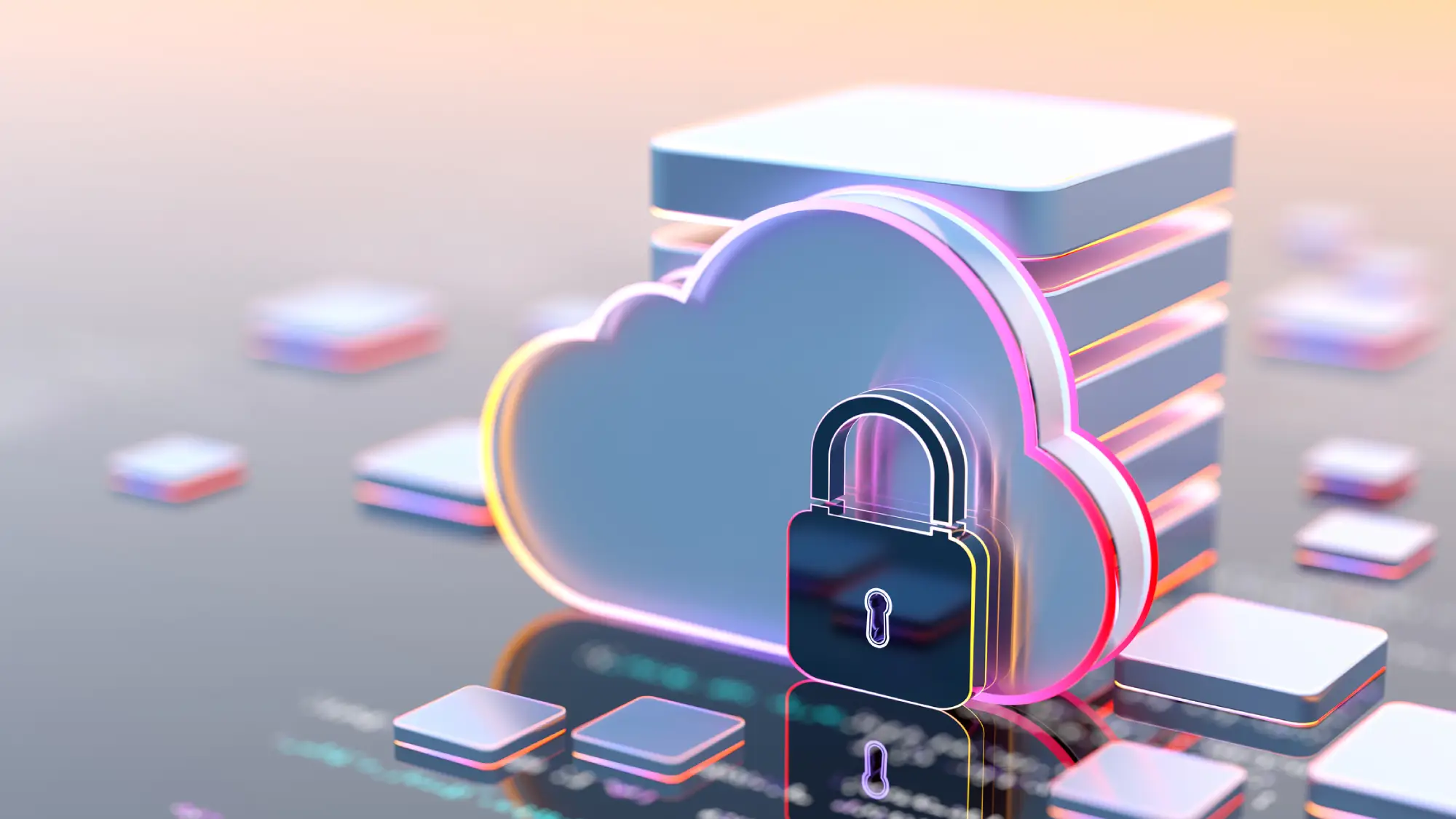What is cloud computing security? How to secure your small business
Cloud security is a key part of many internet cloud based systems — including VoIP. And as more and more small businesses are adopting cloud technology, robust security measures are needed to make sure business is safe online.
Whether you’re a small business owner just discovering cloud technology or simply searching for ways to keep the most important parts of your business safe, we’ve got you covered.
In this guide, we’ll walk you through everything you need to know about cloud security and how it can protect your business data should the worst happen.

What is cloud computing?
Cloud computing is the delivery of different services through the internet. This can be everything from tools and applications — like data storage and servers — to networking and software programs.
Rather than keeping important files on a physical hard drive or storage, cloud computing makes it possible to save these to a remote database, so all members of your business can access them — as long as they have a device like a computer, laptop or tablet, connected to the internet.
Find out more about cloud computing and its benefits for your business with our guide.
What is cloud security?
Cloud security refers to a set of strategies, technologies, and policies designed to protect data, applications, and the infrastructure of cloud computing. It’s a key aspect of IT operations for businesses that use cloud services, whether public, private, or hybrid models.
At its core, cloud security focuses on ensuring data privacy and safeguarding your business against cyber threats like hackers.
The providers we work at Bionic that offer cloud services with VOIP packages, also offer security as part of this - ensuring your data is kept securely.
How does cloud security work?
Cloud security can be complex and has many ways of working. But, its main responsibility is to protect your business, and it does so by:
- Encrypting data — Just like locking a diary, cloud security encrypts data. This means transforming the data into a coded format that can only be read with the right 'key'. When you store information in the cloud, encryption ensures it remains confidential and secure, both when it's stored and when it's being transmitted over the internet.
- Using firewalls and intrusion detection — Firewalls act as barriers, blocking unwanted traffic from reaching the cloud systems. On the other hand, intrusion detection systems are constantly monitoring for suspicious activity or potential threats.
- Using access control — In cloud security, access control ensures that only authorised people can access certain data or resources. This includes using strong passwords, multi-factor authentication, and managing user permissions meticulously.
- Constant monitoring and updates — Cloud security is always on the lookout, continuously monitoring for new threats and updating defences accordingly. It’s like having a guard always on duty, ensuring that the security measures keep up to date with cyber threats.
Why is cloud security so important?
Because businesses are increasingly relying on cloud computing for storing and processing vast amounts of sensitive data, safety and security is really important.
The cloud, while being both flexible and cost-efficient, also presents weaknesses that aren’t usually seen with physical hard drives. Without robust security measures, this data is exposed to cyber-attacks, data breaches, unauthorised access, and more, potentially leading to big financial losses, legal repercussions, and damage to your business reputation.
How secure is data in the cloud?
No matter what data you store in the cloud, you don’t want it to get into the wrong hands.
While no security system is foolproof, data stored in the cloud is typically encrypted to protect it from criminals and hackers, and anyone wanting to access this data needs to have the digital ‘key’ only you should have.
Anyone trying to access the file illegally will be presented with a file that looks like gibberish rather than meaningful data.
What are the benefits of using cloud security?
There are a wide range of benefits when it comes to using cloud security. These include:
- Enhanced security measures — From hacking attempts to sophisticated malware, there are so many ways that hackers will try and gain access to the cloud. Cloud security provides advanced protection, often more robust than you’d receive with more traditional, on-premises storage solutions.
- Better visibility of your business — Cloud security offers improved visibility into your network and data activities. With monitoring tools and analytics built in, organisations can track user activities, data flows, and application performance in real time. This helps in identifying potential security threats quickly, making way for a prompt response and a chance to tackle the incident head-on.
- Lower costs compared to traditional methods — Cloud security gets rid of the need for physical infrastructure that’s required for in-house security measures. When you’re searching for the right cloud services, there’s usually a range of different plans with different price points with providers, meaning you can choose the right one for your business needs. At Bionic we can arrange cloud-based VoIP packages for businesses that are staggered based on usage.
What are the risks associated with cloud security?
While there are benefits to cloud security, that’s not to say that it doesn’t come with its own set of risks and challenges.
- Data breaches and leaks — One of the biggest risks when using cloud security is the potential for data breaches and leaks. Even with robust security measures, the cloud’s accessibility over the internet makes it the perfect target for hackers. A breach can lead to sensitive information being accessed, stolen, or exposed, which can have severe consequences for businesses and individuals alike.
- Less control over data — When you store data on cloud servers, you’re entrusting your information to a third-party service provider. This can result in less control over how this data is managed and protected. It’s essential that, as a business, you understand the policies and practices in place by your cloud provider and ensure that they align with your security needs.
- Vulnerability to cyber attacks — Even with advanced security measures, cloud systems can still be vulnerable to cyber-attacks. Hackers will continuously evolve their methods, exploiting vulnerabilities in software, systems or simply from human error. Find out how a cyber attack could affect your business with our guide.
- Dependency on Internet connection — Cloud services are heavily reliant on internet connectivity. Without a stable internet connection, access to data and services can be disrupted. This dependency not only affects accessibility but also poses a risk if there are network failures or disruptions.
How can businesses enhance their cloud data security?
To enhance your business cloud data security, there are several effective methods. Think of each like a measure that adds another layer of protection.
Choose a reputable cloud service provider
Choosing the right cloud service provider can be invaluable to your business.
Look for providers with a strong track record in data security, offering robust infrastructure and compliance with industry standards. They should also provide transparency about their security practices and data handling procedures so you’re 100% up-to-date.
At Bionic, we only work a panel of trusted VoIP providers who can offer reliable connectivity for VoIP systems with added security.
Implement strong access controls
The last thing you want is your data getting into the hands of hackers because who knows what they could do with this power?
Implementing strong access controls makes sure only authorised personnel have access to sensitive data. Use techniques like role-based access control (RBAC) to assign specific permissions based on job roles, and consider using multi-factor authentication (MFA) for an added layer of security.
Regularly encrypting your data
Data encryption is critical to cloud security. It involves converting data into a coded format that can only be read or processed after decryption, requiring a specific key or password.
Encrypting data in transit — as it moves across the internet — and at rest — when it’s stored on cloud servers — protects it from being messed with or accessed by unwanted people.
It’s also important to manage encryption keys securely, as they’re key to decrypting the data. Essentially, only give the password or key to members of your business that you trust.
Implement strong password policies
Passwords are often the first line of defence against unauthorised access. Implementing strong passwords involves setting criteria for password complexity. This includes:
- Minimum length
- The inclusion of uppercase and lowercase letters
- Inclusion of numbers
- Special characters
Businesses should encourage their staff to regularly change their passwords and discourage the use of password duplication across different accounts — this way, if hackers manage to access another account, they won’t be able to get into any others.
Protect your business with Bionic
Cloud security is an extra layer of protection for your business data. If you currently use cloud-based VoIP systems — it's worth considered extra security as part of your package to take it to the next level. And if you don't have a cloud-based VoIP system yet, get in touch with our team here at Bionic, who can help you secure deals on your business connectivity, from broadband to VoIP services.








